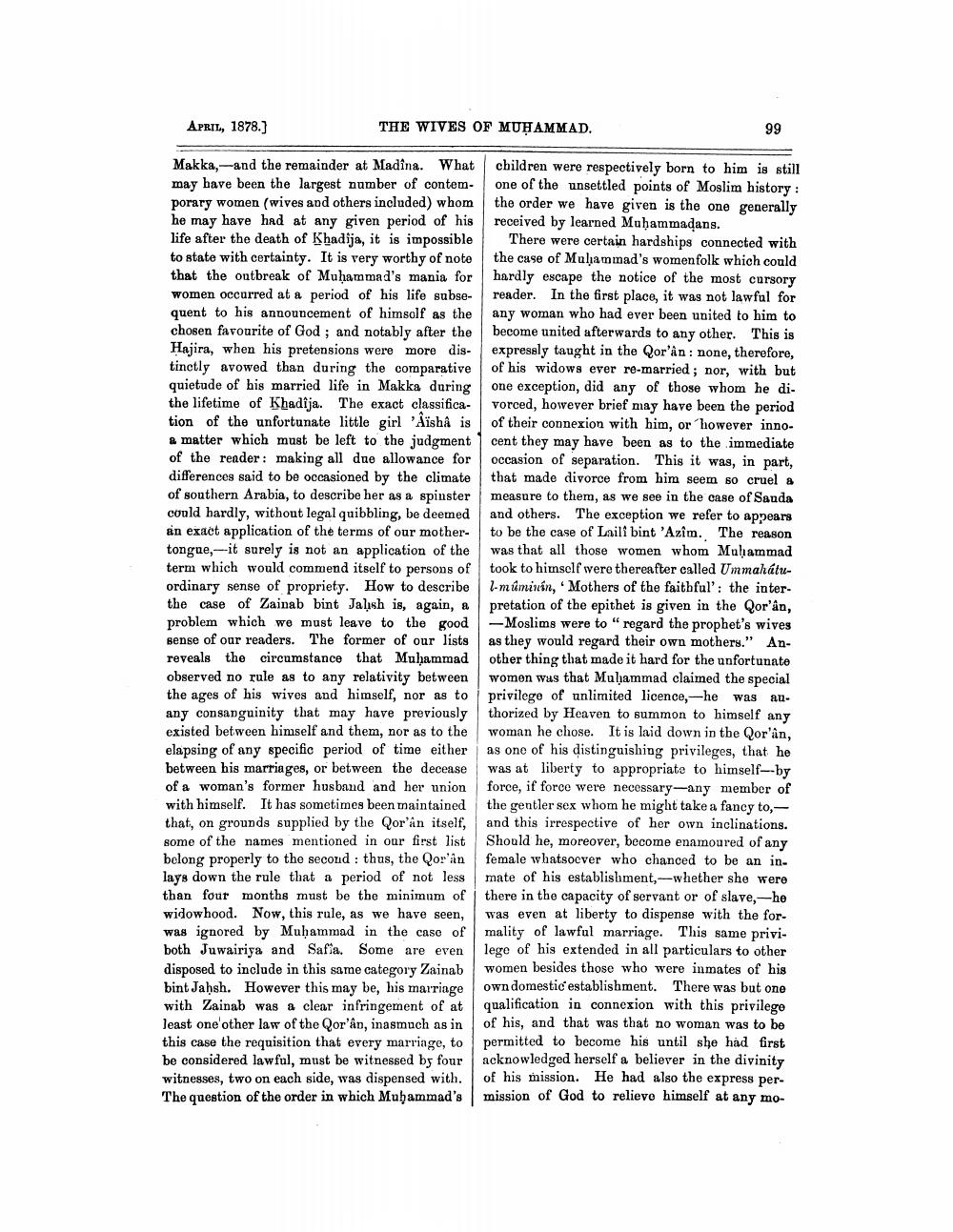________________
APRIL, 1878.]
THE WIVES OF MUHAMMAD.
children were respectively born to him is still one of the unsettled points of Moslim history: the order we have given is the one generally received by learned Muḥammadans.
There were certain hardships connected with the case of Muhammad's womenfolk which could hardly escape the notice of the most cursory reader. In the first place, it was not lawful for any woman who had ever been united to him to become united afterwards to any other. This is expressly taught in the Qor'ân: none, therefore, of his widows ever re-married; nor, with but one exception, did any of those whom he divorced, however brief may have been the period of their connexion with him, or however innocent they may have been as to the immediate occasion of separation. This it was, in part, that made divorce from him seem so cruel a measure to them, as we see in the case of Sauda and others. The exception we refer to appears to be the case of Laili bint 'Azim. The reason was that all those women whom Muḥammad took to himself were thereafter called Ummahátul-mûminin, Mothers of the faithful': the interpretation of the epithet is given in the Qor'ân,
Makka, and the remainder at Madina. What may have been the largest number of contemporary women (wives and others included) whom he may have had at any given period of his life after the death of Khadija, it is impossible to state with certainty. It is very worthy of note that the outbreak of Muhammad's mania for women occurred at a period of his life subsequent to his announcement of himself as the chosen favourite of God; and notably after the Hajira, when his pretensions were more distinctly avowed than during the comparative quietude of his married life in Makka during the lifetime of Khadija. The exact classification of the unfortunate little girl 'Aisha is a matter which must be left to the judgment of the reader: making all due allowance for differences said to be occasioned by the climate of southern Arabia, to describe her as a spinster could hardly, without legal quibbling, be deemed an exact application of the terms of our mothertongue, it surely is not an application of the term which would commend itself to persons of ordinary sense of propriety. How to describe the case of Zainab bint Jalish is, again, a problem which we must leave to the good-Moslims were to "regard the prophet's wives sense of our readers. The former of our lists as they would regard their own mothers." Anreveals the circumstance that Muhammad other thing that made it hard for the unfortunate observed no rule as to any relativity between women was that Muhammad claimed the special the ages of his wives and himself, nor as to privilege of unlimited licence, he was auany consanguinity that may have previously thorized by Heaven to summon to himself any existed between himself and them, nor as to the woman he chose. It is laid down in the Qor'ân, elapsing of any specific period of time either as one of his distinguishing privileges, that he between his marriages, or between the decease was at liberty to appropriate to himself--by of a woman's former husband and her union force, if force were necessary-any member of with himself. It has sometimes been maintained the gentler sex whom he might take a fancy to,that, on grounds supplied by the Qor'ân itself, and this irrespective of her own inclinations. some of the names mentioned in our first list Should he, moreover, become enamoured of any belong properly to the second: thus, the Qor'ân female whatsoever who chanced to be an inlays down the rule that a period of not less mate of his establishment,-whether she were than four months must be the minimum of there in the capacity of servant or of slave,-he widowhood. Now, this rule, as we have seen, was even at liberty to dispense with the forwas ignored by Muhammad in the case of mality of lawful marriage. This same priviboth Juwairiya and Safia. Some are even lege of his extended in all particulars to other disposed to include in this same category Zainab women besides those who were inmates of his bint Jaḥsh. However this may be, his marriage own domestic establishment. There was but one with Zainab was a clear infringement of at qualification in connexion with this privilege least one other law of the Qor'ân, inasmuch as in of his, and that was that no woman was to be this case the requisition that every marriage, to permitted to become his until she had first be considered lawful, must be witnessed by four acknowledged herself a believer in the divinity witnesses, two on each side, was dispensed with. of his mission. He had also the express perThe question of the order in which Muhammad's mission of God to relieve himself at any mo
99




